Getting lost in the wilderness can be terrifying. There might be no food, water, or shelter, and modern technology might not function. Additionally, there can be risks from other factors.
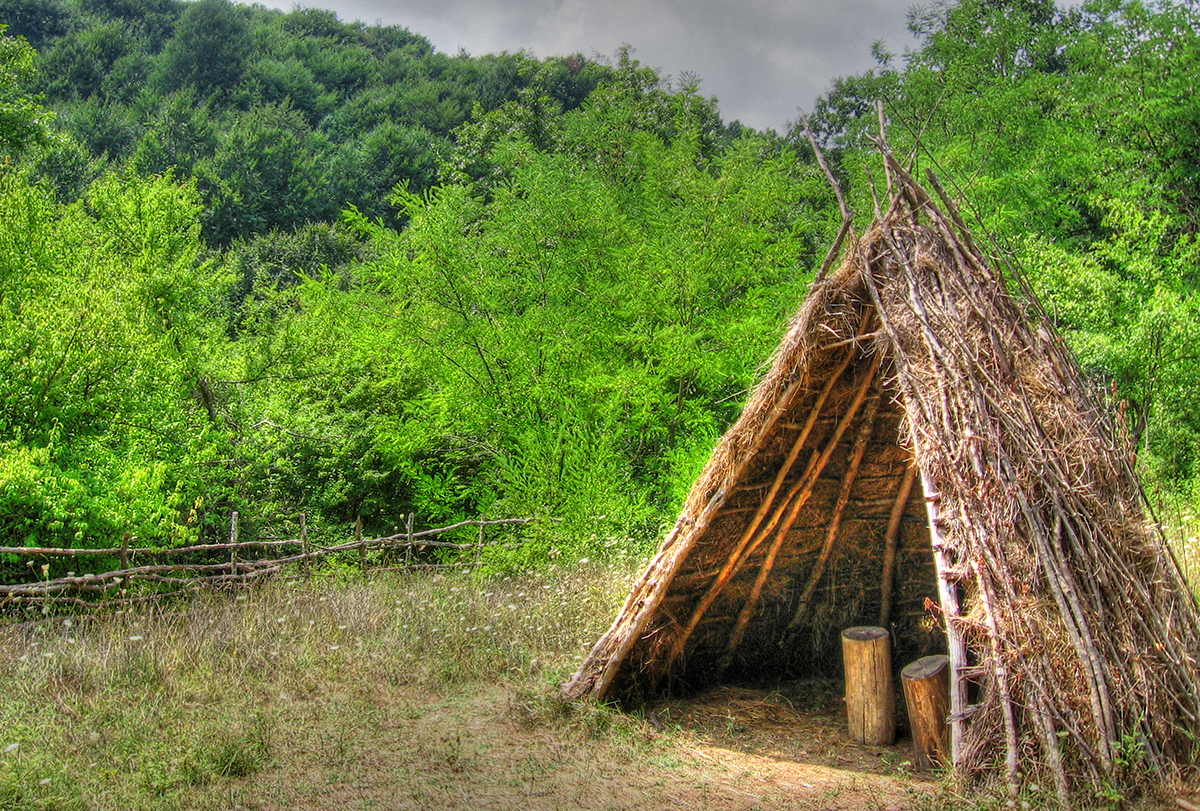
If you don’t know what you’re doing, getting lost in the wilderness can be extremely chaotic and unpredictable and spell serious problems.
If you find yourself in this situation, you must maintain your composure and remember you can survive in the wild. It might help to be aware of clever survival techniques if you get lost or stranded in the outdoors.
Survival Hacks in the Wilderness
Here are some tips and techniques that can come in handy if you suffer small wounds, unexpected delays, or dramatic changes in the weather when venturing outdoors.
1. Prepare well
Before traveling in the wilderness, inform at least two close people of your itinerary and when you expect to be reachable. This small effort can help massively in case you need help, as your friends can contact authorities if you haven’t checked in.
2. Learn basic first aid
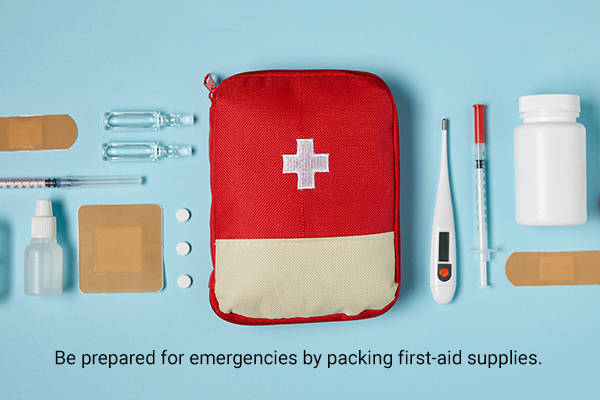
Be prepared for emergencies by packing first-aid supplies. Begin with a pre-made kit, and then adjust it to suit your travel and your medical requirements. All things should be checked for their expiration dates and replaced as necessary.
Consider packing an emergency handbook in case you encounter an unusual medical situation. Learn the basics of first aid such as cleaning wounds, making splints, and different types of dressing.
3. Identify food sources
For this, you will need to study the area you intend to go to beforehand.
Pack energy-dense foods such as peanut butter, chikkis, and dried fruits. To keep your energy levels strong, bring an extra day’s worth of meals, especially no-cook options with excellent nutritional values. Snacks that are salty and simple to digest, including trail mix, almonds, and granola bars, are also suitable for outdoor activity.
Don’t try to hunt, trap, or forage if you don’t have any food; doing so will just put you in danger and cause you to expend valuable energy. However, if you are confident in your abilities to identify edible and safe plants, fruits, or vegetables, you can consume such foods after thoroughly cleaning them in running water and cooking them, if possible.
The average person has enough calories to last for more than 30 days if everything else fails, so fasting is an option. Prioritize setting up camp, getting warm, and staying hydrated more than food. (1)
4. Build a shelter
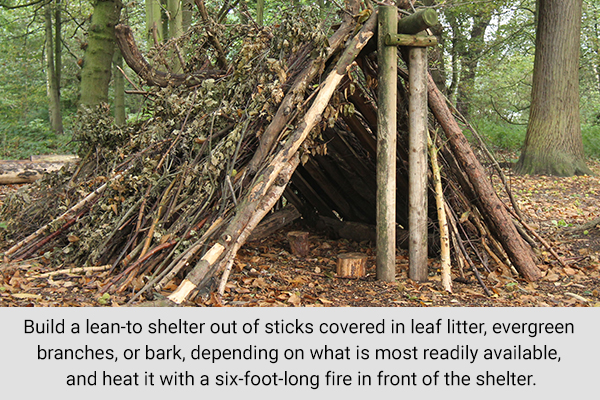
Since finding shelter is a priority, look for natural rock formations, seek shelter inside fallen trees, or make snow shelters (if the snow is deep enough and you have the right tools for digging through snow).
Create a warm, comfortable shelter using the tarp from your equipment, bivouac pad, puffy jacket, and blanket.
Build a lean-to shelter out of sticks covered in leaf litter, evergreen branches, or bark, depending on what is most readily available, and heat it with a six-foot-long fire in front of the shelter.
Create a bed that is at least 8 inches thick out of pine needles, grass, or leaves.
5. Protect yourself from mosquitoes
Carrying mosquito repellent is important in the wilderness to ward off mosquitoes and other bugs. If you do not have it, plant-based essential oils can be used as an effective replacement. (2)
6. Maintain hygiene
Maintaining proper hygiene will ward off most of the problems associated with living in the wilderness such as stomach upsets. Always prefer running water over still water, as there is no guarantee of cleanliness with standing water. (1)
Carry and use a sanitizer with 60% or higher alcohol content if water and soap are not available.
7. Find your way
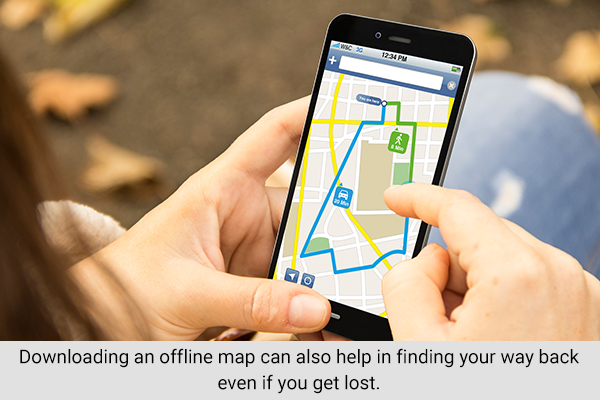
Learn how to identify landmarks specific to the region you are traveling in. Becoming familiar with the region’s terrain may help in finding a route quickly.
Downloading an offline map can also help in finding your way back even if you get lost.
8. Stay warmth
By altering your layers, you can stay warm when at rest and cool while active. Exercise (perform a few rapid jumping jacks), high-quality clothing, a fire (be mindful of safety issues), and layering are all recommended for maintaining warmth.
In cold conditions, avoid perspiring into your garments. Watch out for signs of hypothermia. Warm up with sugary foods, do some exercises, or light a big fire.
9. Identify signs of water sources
Find out if there are any water sources at your location that you can collect water from and treat with your water treatment equipment before you leave on your vacation.
As soon as you begin setting up camp, locate sources of usable water. Find clean drinking water sources in lakes, streams, or snowmelt. To boil and purify water, you can also use a portable filter, chlorine dioxide tablets, or a steel canteen.
Simply drink the water in the worst-case scenario because, statistically, you will be rescued within 24 hours and the risk of dying from dehydration is greater than that of infection. (1)
On your travel, it’s crucial to stay hydrated! Dehydration (loss of salts and water from the body) is more likely to occur when you exercise, which can have detrimental effects on your health.
Drink water frequently and before you start to feel thirsty if you engage in outdoor physical activity, especially in hot weather (hiking, biking, jogging, swimming, etc.).
Do not let yourself become dehydrated by not having your water ready when you need it.
10. Follow rescue protocols
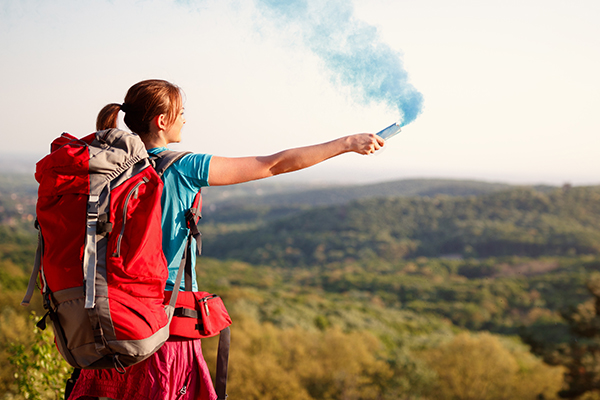
Draw attention to yourself only if you’re sure of being rescued. Use signal mirrors or three blasts on your whistle to attract attention. Use garments and tarps that are vividly colored. To make a smoke signal, add green plants to your fire.
Run around and wave a brightly colored scarf or jacket if you hear a rescue plane or helicopter since movement and contrast are the keys to being noticed.
Final Word
When outdoors, always follow nature’s rules and try to blend in without creating too much of a disturbance for the resident flora and fauna. The wilderness can be a place of great learning experiences and the tranquillity of nature promotes good health.
Remember to take a few precautions in advance and be mindful while in the wilderness, and you will have a safe time.
- Was this article helpful?
- YES, THANKS!NOT REALLY


